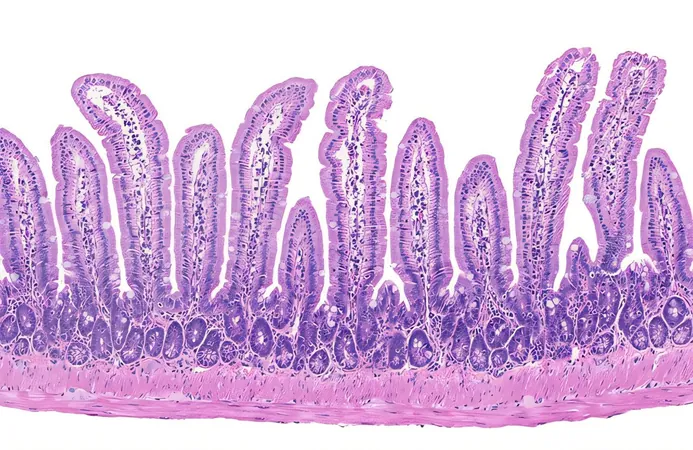
Breakthrough Discovery: New Immune Cells Found That Could Halt Food Allergies in Mice!
2025-04-03
Author: Rajesh
Recent research has revealed that a specific group of immune cells in the intestinal environment plays a crucial role in preventing food allergies. This groundbreaking study from Washington University School of Medicine in St. Louis shines a light on why approximately 30 million Americans, including 4 million children, suffer from food allergies. For these individuals, their immune systems mistakenly identify harmless food proteins as threats, resulting in potentially life-threatening allergic reactions.
Published in the esteemed journal Cell, the research identifies RORγt+ dendritic cells as key players in maintaining tolerance to common food allergens such as peanuts, tree nuts, milk, eggs, and shellfish. Normally, the immune system can differentiate between harmless food and harmful invaders, a process essential for preventing allergies. When this system fails, it can trigger reactions that range from mild discomfort to severe anaphylaxis, which can lead to symptoms such as throat swelling and difficulty breathing.
Dr. Marco Colonna, the leading researcher and Professor of Pathology at WashU Medicine, remarked, "The rise of food allergies is alarming and significantly disrupts people's lives. With a short supply of effective treatments, understanding these immune players offers hope for creating innovative therapies."
In their quest to find solutions, researchers focused on the role of RORγt+ dendritic cells in regulating the immune response to food. By experimenting on mice, they administered ovalbumin, a protein found in egg whites known for its allergenic properties. Mice without RORγt+ dendritic cells showed signs of severe allergic responses, indicating the cells are essential in maintaining food tolerance.
The study found a marked imbalance in the immune cells of allergic mice, highlighting a dominance of T cells that promote allergic reactions over those that dampen them. "We have demonstrated that removing these dendritic cells breaks the tolerance to food allergens," stated Patrick Rodrigues, Ph.D., one of the study's co-authors. "Our goal now is to bolster the function of these beneficial cells to potentially prevent food allergies."
This discovery is promising, not only for managing food allergies but also opens avenues for treating other immune-related conditions, such as celiac disease and inflammatory bowel disease, where the immune system wrongly targets harmless substances in the gut.
While recent FDA-approved medications can help manage allergic responses upon exposure to allergens, the best practice remains to avoid known triggers and have emergency medication like an EpiPen on hand. However, the findings from this study suggest an exciting new frontier in allergy research that could change the lives of millions in the future. Researchers hope to work towards therapies that enhance the protective role of RORγt+ dendritic cells, offering a glimmer of hope to those burdened by food allergies.

 Brasil (PT)
Brasil (PT)
 Canada (EN)
Canada (EN)
 Chile (ES)
Chile (ES)
 Česko (CS)
Česko (CS)
 대한민국 (KO)
대한민국 (KO)
 España (ES)
España (ES)
 France (FR)
France (FR)
 Hong Kong (EN)
Hong Kong (EN)
 Italia (IT)
Italia (IT)
 日本 (JA)
日本 (JA)
 Magyarország (HU)
Magyarország (HU)
 Norge (NO)
Norge (NO)
 Polska (PL)
Polska (PL)
 Schweiz (DE)
Schweiz (DE)
 Singapore (EN)
Singapore (EN)
 Sverige (SV)
Sverige (SV)
 Suomi (FI)
Suomi (FI)
 Türkiye (TR)
Türkiye (TR)
 الإمارات العربية المتحدة (AR)
الإمارات العربية المتحدة (AR)